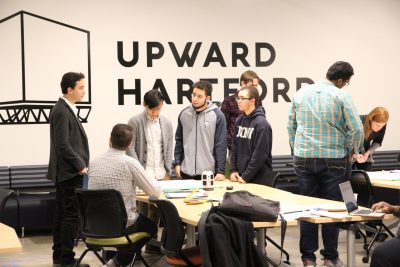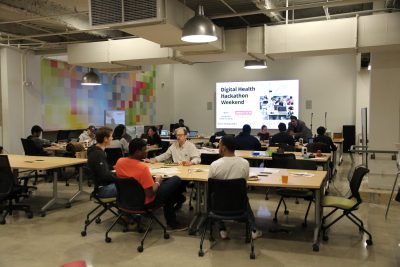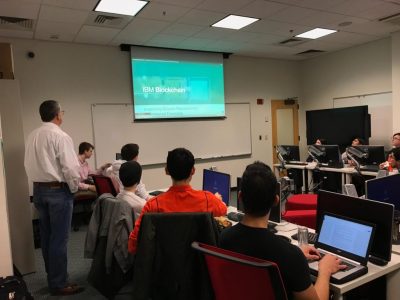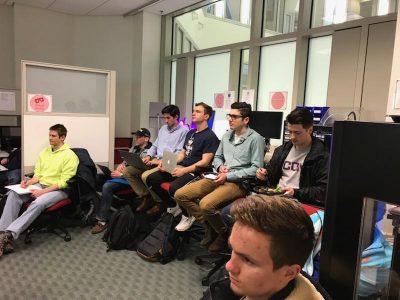 Alberto Principe, a junior Management Information Systems (MIS) major and Data Analytics minor, was introduced to Information Technology as a child.”When I was little my uncle used to fix computers around the house. He was really good at technology so being able to see him fix problems always sparked my curiosity.” It was these childhood experiences that inspired him in his academic career. The MIS major and Data Analytics minor will allow Principe to take the passions of his IT childhood, and apply them to the business world. “I’ve always wanted to be able to get to know computers, but having the ability to combine them in the business world in one cohesive subject has been influential in preparing for my future.”
Alberto Principe, a junior Management Information Systems (MIS) major and Data Analytics minor, was introduced to Information Technology as a child.”When I was little my uncle used to fix computers around the house. He was really good at technology so being able to see him fix problems always sparked my curiosity.” It was these childhood experiences that inspired him in his academic career. The MIS major and Data Analytics minor will allow Principe to take the passions of his IT childhood, and apply them to the business world. “I’ve always wanted to be able to get to know computers, but having the ability to combine them in the business world in one cohesive subject has been influential in preparing for my future.”
Principe has been preparing for his future since his freshman year, making sure to stay active on campus through Information Management Association (IMA) and an on campus job. After hearing about IMA at an on campus career fair, he decided to join and became an active member in the club. His participation and passion for the subject did not go unnoticed, and a year after joining he was elected the Alumni Relations Chair. Principe is the first student to hold this position and has many plans for the following semesters. “My goal is mainly to build a foundation for future Alumni Relations Chairs. At the moment I’m focused on trying to find the right people to contact, how to contact them, and being able to get the IMA word out.” He is trying to make these advancements by boosting social media advertising and reaching out to contacts that would potentially be interested in visiting, becoming mentors, or helping create contacts in companies. In addition to his position on the IMA E-board, Principe works at ITS, the UConn IT Department located on the first floor of Homer Babbidge Library. His position involves solving IT based issues from other students, on the phone or at the support table in the library. This job will give him entry level experience in the IT field, which could open up more opportunities for him in the future.
Although he is unsure about where his future will lead him, he wants to get into a career path that will allow him to develop more efficient ways of completing tasks, such as in machine learning. Machine learning is a relatively new area of technology that focuses on teaching computers how to perform tasks. “It’s really interesting to see how a computer or machine can go from not learning, to doing almost exactly what you want it to do in a really short period of time.”
With another year left at UConn, Alberto is spending the majority of his time focusing on schoolwork and applying for internships. In preparing for the real world, Principe reflected on some helpful experience he has gotten in the classroom. “UConn has exposed me to a lot of group activities. I know in the earlier semesters we are taught to do our work and make sure everything is on time, but now we focus more on applying concepts and working in teams. Being able to work with people we have never met before and work through conflicts and meeting times, is something that I will have to face in the workplace.” After graduation, Principe hopes to move to a big city and work at a company in information technology. He is hoping that this company will help him become an established professional and allow him to build connections with employers and peers.
For younger students pursuing MIS or Data Analytics, Principe encourages students to get involved. “It’s hard to find other MIS students because the major is so small, but come to IMA and you’ll realize all the connections you could have.”
 This year the University of Connecticut was invited to participate in Hackathon, an event hosted by Upward Hartford. Upward Hartford is a new innovation / co-working space located in downtown Hartford open to entrepreneurs looking for a place to create new ideas and other innovative projects. The Hackathon was open to everyone in the community and local colleges were encouraged to send members to participate. This year OPIM Innovate sponsored a team of freshman engineering students who are also pursing the analytics minor. These four exceptional students were eager to sign up and represent the university at the three day event.
This year the University of Connecticut was invited to participate in Hackathon, an event hosted by Upward Hartford. Upward Hartford is a new innovation / co-working space located in downtown Hartford open to entrepreneurs looking for a place to create new ideas and other innovative projects. The Hackathon was open to everyone in the community and local colleges were encouraged to send members to participate. This year OPIM Innovate sponsored a team of freshman engineering students who are also pursing the analytics minor. These four exceptional students were eager to sign up and represent the university at the three day event.
 Following his workshop last week on An Introduction to Blockchain,
Following his workshop last week on An Introduction to Blockchain, 
